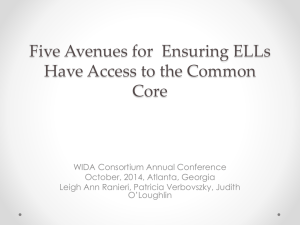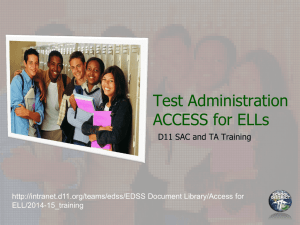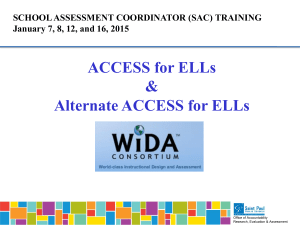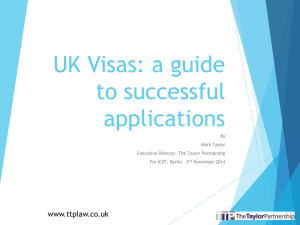What is ACCESS for ELLs?
advertisement
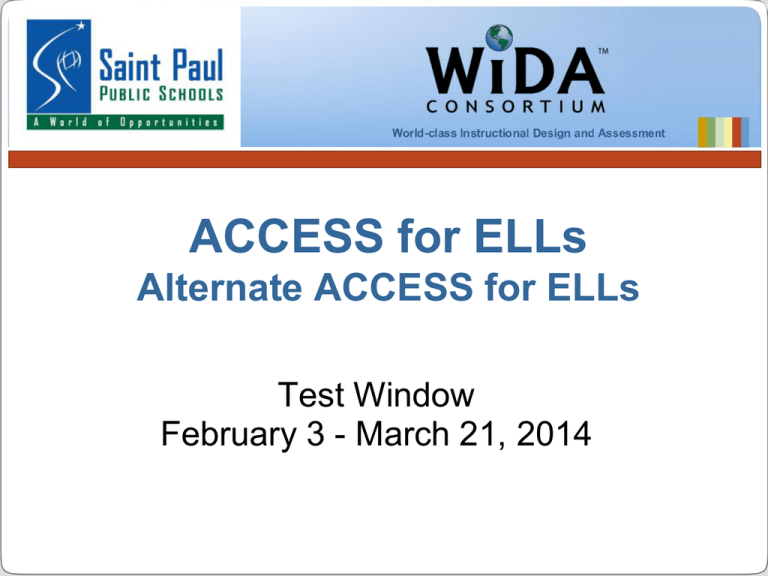
ACCESS for ELLs Alternate ACCESS for ELLs Test Window February 3 - March 21, 2014 What's NEW 2013-2014! • Changes in training requirement (ppt page 6). • Changes in Listening test format (ppt page 14). • Changes in time limits slightly different (ppt page 15). New last year 2012-2013 • Alternate ACCESS for ELLs for some students in grades 1-12 is available. • ELL teachers and/or Special Ed teachers will be trained in January to administer this assessment. 2 Important Dates for ACCESS for ELLs 12/17/2013 - Pre-ID file data provided by the state. Completed. 1/15/2014 - Districts receive test materials. 2/3/2014 - 3/21/2014 - ACCESS for ELLs test window. 3/25/2014 - All test materials returned to MetriTech. 5/27/2014 – Early reports arrive in districts. 8/26/2014 – District receives student paper results, ISR. 3 What is ACCESS for ELLs? It is a large-scale test for English language proficiency based on the WIDA English Language Development (ELD) Standards that form the core of the WIDA Consortium's approach to instructing and assessing English language learners (ELLs) in Grades K–12. It is a secure assessment given annually during a specific test window determined by each state. WIDA Consortium manual 2013-2014 4 Benefits of ACCESS for ELLs Test results are received before school is out in the spring and can be used to plan for next year's instruction. Assesses ELL student growth in the 4 domains: Reading, Writing, Listening & Speaking. Aligned to WIDA English Language Proficiency Standards • • • • • Social and Instructional Language (SIL) Language of English Language Arts (LoLA) Language of Mathematics (LoMA) Language of Science (LoSC) Language of Social Studies (LoSS) K-12 alignment to measure student growth over time. 5 WIDA Training Courses District MLL staff created personal accounts for various SPPS staff to enter the ACCESS for ELLs Online Training Courses and complete the required test training modules. WIDA Consortium manual 2013-2014 Recertification is required for test administrators for the groupadministered tests (reading, writing and listening) is required. Certification required in every domain for new staff. Kindergarten ACCESS requires annual recertification for all domains. Alternate ACCESS requires annual recertification for all domains. District MLL staff are training licensed teachers to administer the grades 1-12 speaking test, K-12 Alternate ACCESS tests and all kindergarten tests. 6 Roles and Responsibilities - SAC ACCESS School Assessment Coordinator Arranges and schedules test sessions for the school. Takes inventory of materials upon receipt and returns materials to MetriTech, the test materials vendor. Verifies that there are enough testing materials. If needed, request additional testing materials from District Assessment Coordinator - robin.lane@spps.org and michael.wirtz@spps.org Distributes test materials in the school on each day of the test. Makes sure test administration is performed by trained test proctors. Reminds test proctors that all test materials are to be kept secure and confidential at all times. Coordinates distribution of teacher reports and parent/guardian reports. 7 Roles and Responsibilities, cont. Test Proctors Attend MLL training for every domain (Train the Trainer) Become familiar with procedures for test accommodations for ELLs with disabilities Properly account for test booklet security immediately before, during, and after test administration Assure that pre-ID labels are attached to test booklets correctly or that student data is properly bubbled in on test booklet covers if no label is provided Administer the ACCESS for ELLs 8 Tier Structure of ACCESS for ELLs WIDA Consortium manual 2013-2014 9 Importance of Tier Placement Test items are presented in 3 tiers for each grade level cluster: A, B, and C. Each tier presents items to the student that are neither too easy nor too difficult. The majority of students will receive the Tier B form of the test. Tier A is intended for very low proficiency students and Tier C is for students close to reaching full English language proficiency. Appropriate tier placement maximizes the accuracy and validity of the ACCESS for ELLs test results. 10 Tier Placement Guidelines MLL staff has designated which tier each student should take based on their ELL Level and number of years in the US. After reviewing the MLL's criteria, when in doubt, place the student in the higher tier. A number of students are no longer considered ELL because of their high performance on the 2012-2013 ACCESS, MCA reading or GRAD reading & writing. 11 SPPS ACCESS for ELLs Tier Placement Protocol Tier A: non-US born students, less than 2 years in the US, and level 1-3 Tier B: US and non-US born, 0-6 years in the US, and level 1-4 Tier C: US and non-US born, 6 or more years in the US, and level 1-5 12 Planning for the Administration Students receiving direct service or support service must participate in the ACCESS for ELLs assessments ACCESS student lists with tier information has been posted to the REA Password Protected Website Student lists of Special Ed Accommodations for ACCESS students will be posted to the REA Password Protected Website https://mis.spps.org/data_center/ 13 Test Administration Duration Change in Listening test format Listening items for the Listening test are precorded for all tiers in grades 1 – 12 Provides to schools on CDs One CD for every eight test forms at each grade level Requires CD player or computer with CD/DVD drive with speakers 14 Test Administration Duration, cont. For scheduling purposes, approximate administration times for each individual test are given below. While this sequence is recommended by WIDA, the sections of the test may be administered in any order. Session 1: Listening and Reading (85 minutes): Listening Test (25 - 40 minutes) Reading Test (35 - 45 minutes) New time change DO NOT affect students with IEPs/504 Plans who require an extended time accommodation Plus 15 minutes convening students and distributing/collecting materials 15 Test Administration Duration, cont. Session 2: Writing (75 minutes): Writing Test Tier A; grade-level clusters 3-5, 6-8, and 9-12 should take no more than 60 minutes Writing Test Tier A; grade-level cluster 1-2 (30 minutes, plus five (5) additional minutes to finish writing if needed Writing Test Tiers B and C; all grade-level clusters (60 minutes), plus five (5) additional minutes to finish writing if needed Plus 15 minutes for convening students and distributing/collecting materials 16 Test Administration Duration, cont. Session 3: Speaking (15 minutes): The Speaking Test is individually administered Plus 5 minutes for transition between students 17 Test Materials Orders ACCESS for ELLs materials, grades K-12, were ordered using information provided by the MLL Dept. Alternate ACCESS for ELLs and Large Print books for some students in grades 1-12 were ordered using information provided by the MLL and Special Ed Departments. Additional materials may be ordered if necessary. Braille is available for ACCESS for ELLs Braille accommodation must be indicated in the student’s IEP. Only Tier B test form is available in Braille. 18 Test Security Only district and school test coordinators and test administrators (or other authorized staff) may handle secure test materials. Ensure that all staff viewing materials sign a Non-Disclosure Agreement. Available at http://rea.spps.org/Test_Coordination2.html. Place all secure materials in locked storage. Do not leave materials unattended before, during or after testing. Do not share any specific test information with students prior to, during or after testing. Do not copy any test booklets or other secure materials. 19 Test Security cont. Track all secure test materials. Anything that contains a test item is considered secure and must be tracked. SCHOOL SECURITY SIGN-OUT FORM tracks test/answer books, scripts, charts, etc. from the coordinator to the test proctor. CLASSROOM SECURITY CHECKLIST (Student List with tiers) tracks test books from the proctor to the student. The proctor must sign at the bottom of these lists. Excel file with pre-coded students is available on the REA Password Protected Site in the Data Center and may be used as the Classroom Security Checklist; you will need to add a test booklet number column. https://mis.spps.org/data_center/ 20 Sample School Security Signout Form - from SAC to Proctor Grade Materials Kindergarten Administrator Kits Security Numbers Receiving Test Administrator’s Signature Date & Time Received School Test Coordinator’s Signature Date and Time Returned Student Response Booklets 1-2 Tier A Test Booklets Administrator scripts 1-2 Tier B Test Booklets Administrator scripts 21 Test Security cont. SACs must hold a training meeting for all ACCESS proctors from your school about test security. SACs must have school proctors sign-in to prove they attended the meeting. SACs must have school proctors sign one Non-disclosure Agreement per school year. 22 Test Security & Training Proctors Topics to cover during your training meeting Proctors must be impartial observers (cold hearted?) during the test administration. Have proctors call their SAC with any questions they may have about test items. Reproducing or paraphrasing an item in an email or in writing is a MAJOR breach in security. 23 Test Security & Training Proctors, cont. Pencils and dictionaries Pencils - #2 only, mechanical pencils or pens may NOT be used - schools provide or students may use their own. Cell phones, PDAs or translation devices may not be used. Dictionaries may not be used. 24 Test Security & Training Proctors, cont. Materials Not Allowed During Testing All instructional posters and graphics in the classroom or on a student's desk that are related to the subject being tested must be covered or removed during the administration of a test assessing the subject. If the materials are related in any way to the subjects being tested, they must be covered or removed. (revised MDE policy 2010-2011) ALWAYS follow MDE policy. The ACCESS for ELLs manual states posters and graphics in classrooms don't have to be covered or removed. This is incorrect for Minnesota test administrations. 25 Test Security & Training Proctors, cont. TEST ADMINISTRATION REPORT (TAR) All invalidations of a student’s test must be documented on the MDE TAR which is available on the REA Test Coordination website. http://rea.spps.org/Test_Coordination2.html All unique circumstances; transcribing answers, fire drills, etc. must be documented on a TAR 26 Test Security & Training Proctors, cont. Lavatory use or illness during testing – collect test materials from student before s/he leaves the room What to do when students finish the test Remain seated or leave the classroom? you decide 27 Send tracking paperwork & Non-Disclosure Agreements to the Testing Office at 360 Send paperwork through district mail to the REA Testing Office, 360 Colborne Copy of Monitor Training Sign-in Sheet Non-Disclosure Agreements-one for every person that had access to tests One non-disclosure agreement per person per year School Security Signout Form, signed From the SAC to the Monitor Classroom Security Checklists (student lists), signed From the Monitor to the Student Copy of Test Administration Report(s) if needed 28 Materials for Each School School Packing List - use to inventory materials notify DAC if anything is missing Grade/Tier Header Sheets Documentation of Materials Not Returned Form District and School Test Administration Manual, secure must be returned to vendor Speaking Tests for each grade-level cluster; Listening, Reading and Writing test/answer booklets 29 Materials for Each School, cont. Test Proctor script/manual for each grade cluster & tier tested 1 per set of 8 booklets ordered (grades 1-12) 1 per set of 15 booklets (Kindergarten) 5% overage of student test booklets are included 30 School Procedures Upon Receipt of Test Materials Inventory materials Divide test booklets into groups for each scheduled testing session. Test booklets may not be distributed prior to testing session Decide who does the following, SAC or Proctors Place pre-ID labels containing the student demographic information in the box on the front cover of the test booklet. If pre-ID label contains incorrect information, all of the demographic information for that student must be filled in by hand on the student's test/answer book. 31 Miscellaneous Information Mark students absent/not tested for specific tests at the end of the test window To handle errors on pre-ID labels, see information beginning on page 17 of the ACCESS Test Administration Manual must hand bubble an answer document for the student if the student label has errors Large print test answer must be transcribed to a scannable test/answer book. must complete a MDE Test Admin Report (TAR) with name of student and scribe. 32 Miscellaneous Information, cont. How to package materials for return to MetriTech, Inc. Know your district and school ID numbers to bubble in on header sheets One grade cluster and tier under each header sheet. i.e. cluster 3-5 Tier A uses one header sheet, cluster 3-5 Tier B uses a different header sheet All materials will be returned to MetriTech from the schools, NOT the Testing Office as written in the manual ALL test/answer books, scripts, Kindergarten kits & Speaking test flip charts are secure and MUST be returned to MetriTech. Use plastic bags to return all scorable test/answer books. 33 Questions or Comments? For more information, please contact the WIDA Help Desk: 1-866-276-7735 or help@wida.us World Class Instructional Design and Assessment, www.wida.us Center for Applied Linguistics, www.cal.org Develops test items, conducts research on assessments and provides technical and psychometric expertise to the WIDA Consortium MetriTech, Inc., www.metritech.com Prints, scores, reports and distributes all ACCESS for ELLs test materials and results © 2010 Board of Regents of the University of Wisconsin System, on behalf of the WIDA Consortium www.wida.us Robin Lane District-wide Testing Coordinator (DAC) Research, Evaluation and Assessment Testing Office 360 Colborne Street robin.lane@spps.org 651.767.8257 - phone 651.335.3753 - cell SPPS Test Coordination Website http://rea.spps.org/Test_Coordination2.html 35 Michael Wirtz District-wide Testing Coordinator (DAC) Research, Evaluation and Assessment Testing Office 360 Colborne Street michael.wirtz@spps.org 651.632.3776 - phone 651.261.0045 - cell SPPS Test Coordination Website http://rea.spps.org/Test_Coordination2.html 36 Front and Back Covers of Test Booklet X X X X Place correct student label here if available. X X X X X X MARSS # Fill in grids if you do not have a correct. X CIF # X 37
